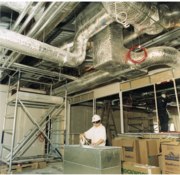Clean ventilation systems are efficient ventilation systems

Properly installed ductwork that is subsequently kept clean is the key to a productive workplace and energy-efficient operation.
Energy efficiency seems to be the only game in town at the moment, but that doesn’t mean we can ignore health, safety and productivity issues, says NIGEL EDWARDS-HUGHES.Climate change is undoubtedly the biggest challenge facing our industry and our society. The recent Stern Review has raised the energy stakes even further by focusing on the economic consequences of ignoring the problem and by drawing attention to the business opportunities climate-change mitigation presents. However, the almost hysterical focus on carbon emissions now gripping our politicians does not change the fact that building owners and operators have responsibilities for the immediate needs of their occupants. Short-term health-and-safety requirements press on them every day of the week, and it is often difficult to marry those responsibilities in with the demands of the wider climate-change agenda.
Research A good case in point has been highlighted by research carried out by the American Society of Heating, Refrigerating & Air Conditioning Engineers (ASHRAE). This showed how increased ventilation could help students perform better at school and college. Better air quality, lower temperatures and increased ventilation in classrooms increases student performance by 10 to 20%, says ASHRAE, adding that students made fewer mistakes and worked more quickly in improved conditions. ‘Is it possible that “Johnny can't read because Johnny can't breathe”?’ asks ASHRAE president Terry Townsend. ‘The preliminary results seem to indicate the answer is “yes”. The study confirms the findings of earlier ASHRAE research that increased ventilation rates positively impact productivity in buildings.’ The research was carried out at the University of Denmark, and the results will be incorporated into ASHRAE’s technical guidance for building-services engineers. Schools in the US clearly have problems that we may not regularly encounter in the UK, but the underlying message about providing adequate air quality for learning equally applies to schools, offices and other occupied spaces over here. Under UK health-and-safety legislation, employers must appoint a ‘responsible person’ to ensure that everything is done to safeguard building occupants. That person is now right in the firing line and to cover themselves must ensure that ventilation systems are regularly inspected and, if necessary, cleaned. A problem we find in many office buildings is that the responsible person has either not been appointed or is unclear what action to take when it comes to indoor air quality.
Litigation Failure to adequately provide conditions that safeguard the health of occupants puts building operators — quite rightly — at risk of litigation. They also have the added complication of the soaring cost of insurance. Insurance firms often use poor maintenance of ventilation extract systems as grounds for fighting claims made by owner operators after fires or employee health problems because they can assert that warranties have been breached due to lack of proper cleaning regimes. Kitchen-ventilation systems are another area of real concern in this regard, and there has been a series of high profile cases in recent years. The main tool developed by the industry to address this need was the specification drawn up by the HVCA and its members: ‘Specification for kitchen ventilation systems’ (DW/172). This is the successor to DW/171 because both the building-services ductwork industry and its customers recognised that best practice guidance must carry greater weight and become a requirement for kitchen designs to gain the backing of the insurance community. For example, since the standard came into being the Loss Prevention Council has published approved procedures for the testing and grading of grease filters. This was subsequently endorsed by the Association of British Insurers and is a key element of the specification document.
Insurance policies Providing proof that a maintenance regime is in place and working is essential these days, which is where the HVCA’s TR/19 guide to good practice on the ‘Internal cleanliness of ventilation systems’ comes into its own. This comprehensive source of information on ductwork cleanliness is designed to be used by specifiers, consultants and building legislators to ensure that ventilation systems are properly maintained — vital when it comes to securing insurance policies. Such attention to ductwork hygiene does not diminish in any way our need to tackle energy waste and our impact on climate change. In fact the ventilation industry is perfectly capable of tackling both at the same time. Properly installed and cleaned ventilation also means reduced energy bills. A fan left chugging round for years carrying the extra weight of dirt built up on its surface will use significantly more energy than if it was operating in a clean environment where the resistance is much lower. Components will also last longer because of reduced wear and tear on bearings. Putting a planned-maintenance regime in place and sticking to it gives any building owner or operator a fighting chance of protecting their occupants while also meeting the increasingly important task of reducing their impact on climate change.
Nigel Edwards-Hughes is chairman of the HVCA’s Ventilation Hygiene Branch. Copies of the’ Specification for kitchen ventilation systems’ (DW/172) and ‘Internal cleanliness of ventilation systems’ (TR/19) are available from the HVCA Publications Unit (Rachel Davidson, tel. 01768 860405 or e-mail at hvcapublications@welplan.co.uk), or via the association’s website.
Related links:
Related articles:


